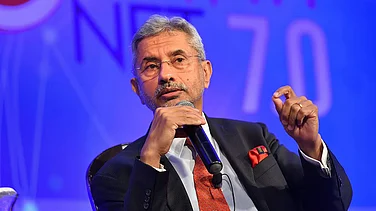This Mother’s Day, I remember the phenomenal matriarch of our family — my mother’s mother, my Didan. On 18th of April, 2023, quietly, and I believe, reluctantly, Didan excused herself from the revelries of the world. I guess this was her way to celebrate Nobo Borsho. A new life in a new universe where she would not be ‘Didan’ but Ms Anuradha Banerjee —probably, the CEO of a food and beverage company, travelling the world in private jets and writing romantic letters to her distant lovers.
Didan was born in Gopalpur, Burdwan district, West Bengal. At a young age, she married my grandfather, Dr Krishnapada Banerjee. Didan’s life always revolved around family and domestic chores. However, every kind of crisis was resolved by a fine balance between diplomacy and emotion. Even as a grandmother, she was always tactful and astute. She would bargain her way out; stand stubborn to reclaim what rightly belonged to her — skills that women often deny themselves.
‘Not people die, but worlds die with them’*
I will always remember Didan as an epicurean soul. She was passionate to preserve traditional culinary delights of Bengal. Now, that she is gone, the aromatic universe of Potol-er Dorma, Motor-Shuti-r-Kochuri, Taal-Phuluri, Phoolkopi-r Shingara, is gone along with her. Rightly did Soviet poet Yevgeny Yevtushenko said, “not people die, but worlds die with them.”
In the age of hyper digital consumption, Didan stood like a testimony to cherishing companionship through food. Our cosmopolitan idea of feminism may deride women who spend hours in the kitchen. But this invisible labour is also a visible form of love that we usually take for granted. Winters would incite a flurry of excitement in Didan — she could not wait to make crispy kochuris with the first green peas of the season. Unworried about her severe knee-pain and even inability to walk, she would deliver them herself to our home. The moment I would see her getting down from the rickshaw, I would know that dinner was not to be missed.
‘To strive, to seek, to find, and not to yield’ *
My childhood perception of Didan as a food-genie slowly matured into an understanding of her as a woman, a human being — complete with fortes and foibles. She was a curious, ambitious spirit attracted to growth, prosperity, and a commitment to live life to the fullest.
One evening in July, 2022, I received a frantic call from her. She demanded a smartphone, one with a ‘good’ camera and connectivity. Her Ulyssean temper was hurt. She was rather angry at everyone — the world that once gathered at her feet to listen to stories was now buried in a phone. She wanted to know what laughter or discussion could WhatsApp memes generate that her age-old fables, idioms, and fart-jokes could not.
Sometimes, I would wonder if our traditional understanding of feminism would be fluid enough to accommodate women like Didan. Here was a lady who loved her husband dearly. Yet, always preferred to be addressed by her name, not surname. She read newspapers every day, listened to the radio, read novels, watched soapy serials, yet covered her head with a ghomta, wore shankha, pola, shindur, and fervently prayed to gods. She loved her daughters, was always worried about their marriage but made sure that each of them received the education they desired. Back then, Didan never hesitated to step out, to travel by bus or train, to speak to university officials and get my mother admitted to Visva-Bharati University, Shantiniketan. She treated all her sons-in-law like sons, pampering them, yet critiquing, if they failed to do the best for her daughters.
I have not seen her get carried away, emotionally though she deeply cared about people. She maintained a practical, objective relationship; a transactional understanding too, of support and friendship. Didan was almost the self-appointed supreme leader of the family and the neighbourhood. If she needed anything, she would simply call someone out from the streets and get the work done. Anybody who helped her would be precious in her memory and she would go to any length to help them back.
‘When love beckons to you, follow him’*
Once, I asked Didan if she regretted anything in life. She expressed not having experienced romantic love — “shob-i holo, shudhu, prem kora holo na.” It fascinates me to think about her as a homemaker driven by the desire to feel the ecstasy of an adventurous relationship — the wait for a lover, the heartbreak, the flutter in her belly, simply thinking about her precious one. However, this regret was compensated by a deep sense of healthy self-love.
Didan once gifted me a pair of earrings, but before I could wear them, she said, “You know, they are really beautiful, I will wear them first.” I admired her unabashed demand for things she wanted. During weddings, she would constantly request the photographers to click her photos, that too in every possible fashion. She refused not being noticed. Sometimes, Didan would consciously steal snacks at a feast, hide them in her purse to bring them back for us; a practice that was frowned upon by our mother. But Didan could never give up the sheer thrill of her thug life.
‘I want to sing’*
In the past few months, we could see light diminish from Didan’s body. She turned feeble, and her memory failed to recollect the way she lived among us. Age is cruel—it reduces us to a mere spectre. All of us would drop in for a few hours to meet her. She would often complain about her loneliness. The radio was her constant companion.
Now, when I look back, I think she led a good life; not like us, torn between being who we are and what the world wants us to be. She never aspired to achieve the image of a superwoman, yet, she was one in her own ways. The purpose of her life was to live it to fullest according to her idea of happiness and success. Didan left us like silent morning dew and she will always be remembered like a melodious bird in a storm — “I want to sing like the birds sing, not worrying about who hears or what they think.”
Notes:
* ‘People,’ Yevgeny Yevtushenko
*‘ Ulysses,’ Alfred Lord Tennyson
* ‘On Love,’ Kahlil Gibran
* Quote by Rumi




















